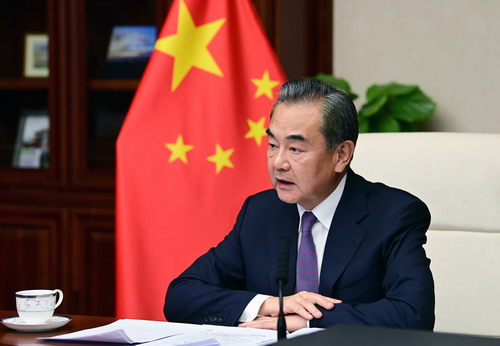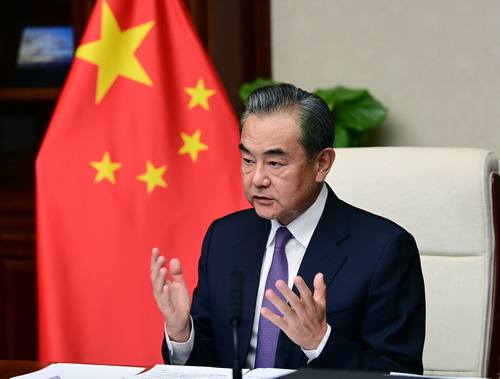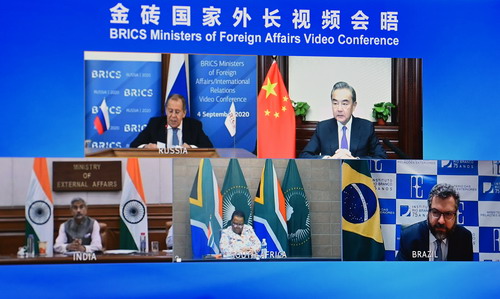
The People’s Republic of China



On the evening of 4 September, State Councilor and Foreign Minister Wang Yi attended in Beijing the BRICS Ministers of Foreign Affairs Video Conference. The meeting, chaired by Foreign Minister Sergey Larvov of Russia, was also attended by Foreign Minister Subrahmanyam Jaishankar of India, Foreign Minister Naledi Pandor of South Africa and Foreign Minister Ernesto Araújo of Brazil.
Wang noted that this year, BRICS countries have had a series of activities in economy, trade and finance, in political and security affairs, and in people-to-people exchange in spite of the impact of COVID-19. Cooperation in the above three main fields has achieved all-round progress, which demonstrates the BRICS partnership, a spirit of mutual support tested by trying times.
Wang stressed that today's world is undergoing momentous changes, and faces new threats and challenges. COVID-19 directly threatens human health; unilateral and bullying acts pose grave challenges to the international order; and protectionism brings major impact to the world economy.
That said, peace, development, and cooperation for mutual benefit remain the defining trend of our time; economic globalization keeps moving forward despite the twists and turns; and emerging economies represented by the BRICS countries continue to rise collectively. In this context, BRICS countries need to shore up confidence, deepen cooperation and intensify coordination, so as to fulfill responsibility for global peace and development.

Wang made four proposals:
First, BRICS countries need to jointly tackle the COVID-19 challenges. China supports the idea of making public health cooperation a priority of BRICS cooperation and setting up a BRICS rapid response mechanism to deal with threats such as COVID-19 and other emerging communicable diseases. BRICS countries need to enhance joint response, and increase support and resource inputs for WHO, in an effort to build a global community of health for all.
Vaccines should not be monopolized by any country, or be the exclusive luxury of big powers or rich countries. BRICS countries need to make joint contributions to vaccine affordability and accessibility in developing countries and press ahead with the BRICS vaccine R&D center.
Second, BRICS countries need to jointly advance multilateralism. Now more than ever, BRICS countries need to uphold multilateralism and safeguard the UN's central role in international affairs amid the myriad global threats and challenges. The outcomes of the World Anti-Fascist War should not be disavowed and the UN's contributions to world peace and development are never to be discredited. It is important to uphold the international order based on international law, advocate win-win cooperation, reject willful withdrawal from international agreements or organizations, and oppose provocation of confrontation between ideologies and social systems. BRICS countries need to reform and enhance the global governance system to strike a balance between fairness and efficiency.
Third, BRICS countries need to jointly promote global economic recovery. While ensuring safety, BRICS countries need to actively rebuild economy, reopen businesses and schools in an orderly manner, and set up "fast tracks" and "green lanes" to facilitate the flow of people and goods.
BRICS countries must firmly safeguard the multilateral trading system, and promote trade and investment liberalization and facilitation to pursue high-quality development and "green recovery". It is essential to oppose the politicization of scientific and technological issues, unilateral sanctions and long-arm jurisdiction, and urge all countries to provide a fair, just and non-discriminatory business environment.
Fourth, BRICS countries need to jointly promote the political settlement of regional flashpoints. It is important to encourage the UN to play its crucial role in mediation. BRICS countries should stand up to reckless coercion and sanctions and to the threat of force. It is important to uphold the principle of state sovereignty and oppose interference in the internal affairs of other countries and instigation of color revolutions.

On BRICS cooperation, Wang stressed the importance of making all preparations for the BRICS Summit and working for its positive outcomes. He added that BRICS countries need to:
l consolidate the basis for political and security cooperation, jointly uphold international fairness and justice, and reject unilateralism;
l build the edifice of economic and financial cooperation, enhance the international influence of the New Development Bank, speed up the building of the BRICS Partnership on New Industrial Revolution, and further expand practical cooperation for mutual benefit;
l tighten the bonds of people-to-people exchanges and cooperation by promoting mutual learning of each other's culture and greater understanding and affinity among the peoples.
Wang emphasized that the world is undergoing profound changes unseen in a century. Collectively, BRICS countries have 30 percent of the world's landmass, 42 percent of the global population and 20 percent of the global GDP, which puts them in a good position to serve as an anchor of stability in this changing world. With solidarity and partnership, BRICS countries will contribute more to world peace and stability, advance common development worldwide and promote international equity and justice. Joint endeavors of the five countries will not just meet their shared interests, but also benefit the whole world.
At the meeting, the five foreign ministers had an in-depth exchange of views on the global situation, regional flashpoints and BRICS cooperation. They spoke highly of the fruitful achievements in their three main fields of cooperation, applauded Russia's work as the rotating chair, and agreed to enhance solidarity to meet challenges under the current circumstances.
They highlighted that as the UN celebrates its 75th anniversary this year, countries need to uphold the basic norms of international relations premised on the UN Charter, support greater democracy in international relations and multipolarity, and respect the principles of sovereign equality and no interference in internal affairs. They stressed that international and regional hotspot issues should be resolved by political and diplomatic means and through dialogue.
They agreed that multilateralism is the most effective way to fight COVID-19, and that BRICS countries need to step up cooperation to combat the disease and make greater contribution to global public health security. They expressed support for strengthening macro policy coordination to ensure post-COVID-19 economic recovery and sustainable development.
The meeting also released a media statement.



